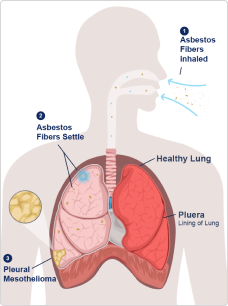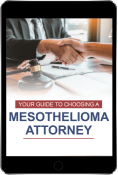Malignant mesothelioma is a cancer caused by asbestos that forms in the lining of the lungs, abdomen, heart, or testicles. One-third of patients are U.S. veterans, as the military used asbestos for decades before the risks were fully known. The Mesothelioma Veterans Center helps veterans and families access VA benefits, compensation, and treatments to make life after a diagnosis easier.
What Is Mesothelioma?
Malignant mesothelioma is an aggressive cancer that affects the mesothelium — the thin layer of tissue that covers internal organs. It develops after asbestos fibers become stuck in different parts of this tissue.
 U.S. veterans are at a high risk of mesothelioma cancer since asbestos was used by all military branches between the 1930s and early 1980s.
U.S. veterans are at a high risk of mesothelioma cancer since asbestos was used by all military branches between the 1930s and early 1980s.
Mesothelioma patients have an average life expectancy of 12-21 months after being diagnosed, but with aggressive treatments like surgery, long-term survival may be possible. Some patients have lived for 15 years or more thanks to mesothelioma treatments.
At the Mesothelioma Veterans Center, we know how overwhelming a mesothelioma diagnosis can be — and we're here to help your family during this difficult time.
Our team may be able to connect you with benefits offered by the U.S. Department of Veterans Affairs (VA), treatments, doctors, and financial compensation. Find out all the ways we can help in our Free Veterans Packet.
Quick Facts About Mesothelioma
- It takes 10-50 years for mesothelioma to appear after asbestos exposure.
- Roughly 1,000 veterans develop mesothelioma each year.
- The most common type of this cancer is pleural mesothelioma, which forms in the lung lining.
- Top treatments include surgery, chemotherapy, radiation, and immunotherapy.
- The 5-year survival rate is 12%, but some patients can live for decades.
- Veterans with mesothelioma often qualify for $3,946.25 a month through VA disability benefits.
- The Mesothelioma Veterans Center can help veterans access VA benefits, compensation, and medical care. Call (877) 450-8973 to get started.
Mesothelioma Causes
The only known cause of mesothelioma is asbestos exposure.
Asbestos is a fiber-like mineral once used in thousands of products since it was lightweight, fireproof, and very durable. However, if asbestos fibers are breathed in or swallowed, they can damage healthy tissues and cause normal cells to turn into cancerous ones.
How Much Asbestos Exposure Causes Mesothelioma? There is no safe amount of asbestos exposure. A single fiber can lead to mesothelioma or another asbestos-related illness.
How Mesothelioma Develops
- When asbestos-containing products are handled or damaged, people may breathe in or swallow asbestos fibers.
- Asbestos fibers embed themselves in the linings of major organs and cause irritation.
- After 10-50 years, malignant mesothelioma cancer may develop.
Who Is at Risk of Mesothelioma?
Anyone exposed to asbestos is at risk of mesothelioma, though more exposure increases the odds of developing this cancer. Those at the highest risk worked with or around asbestos-containing products every day.
Workers with a very high risk of mesothelioma include:
- Boilermakers
- Construction workers
- Electricians
- Mechanics
- Plumbers
- Shipyard workers
- Veterans
“Asbestos didn’t kill anybody on the spot, that’s for sure. It took years later. That’s when it started catching up with us.”
— Walter Twidwell, U.S. Navy veteran with mesothelioma
Anyone who worked with or around asbestos may have also exposed their family members secondhand.
Asbestos fibers could get stuck to hair, clothing, and skin. Workers could bring the fibers home with them after the work day was done, unknowingly putting their loved ones at risk.
Veterans and Mesothelioma Risk
U.S. veterans have a high risk of mesothelioma due to the widespread use of asbestos in the military between the 1930s and early 1980s.
During this time, the U.S. military used asbestos throughout ships, bases, vehicles, and other assets. The dangers of exposure weren’t fully known since manufacturers of asbestos-based products hid the facts from the general public.
Every branch of the military used asbestos, including the:
- U.S. Air Force: Planes and other aircraft used by the Air Force were built with asbestos to reduce the risk of fires. Insulation, wires, and heat shields were among many plane components that contained asbestos and put Air Force veterans in danger.
- U.S. Army: The Army used tons of asbestos to build its bases and barracks. Asbestos-containing products like brakes could also be found in many Army vehicles.
- U.S. Coast Guard: Hundreds of Coast Guard ships were built with asbestos-based products for fireproofing and insulation.
- U.S. Marine Corps: Marines may have been stationed on bases or ships that were built with asbestos, which put them in danger of mesothelioma.
- U.S. Navy: There have been more mesothelioma cases in Navy veterans than in any other branch of the U.S. armed forces. U.S. Navy ships were packed with asbestos products, putting those aboard at risk. Navy shipyard workers had to install and remove these products, causing many of them to get sick, too.
If you or someone you love is a U.S. veteran with mesothelioma, we may be able to help. Learn how to access VA benefits, financial compensation, and treatments in our Free Veterans Packet.
Types of Mesothelioma
Patients are diagnosed with one of four types of mesothelioma, depending on where the cancer tumors develop in the body.
The four types of mesothelioma are:
- Pleural mesothelioma, which forms in the lining of the lungs
- Peritoneal mesothelioma, which develops in the abdominal lining
- Pericardial mesothelioma, which affects the heart lining
- Testicular mesothelioma, which forms in the lining of the testicles
Doctors use unique treatments for each type of mesothelioma, and some types are easier to treat than others. Still, it’s possible to become a long-term survivor no matter which type of mesothelioma you have.
Learn about each mesothelioma type below.
Pleural Mesothelioma
Malignant pleural mesothelioma develops in the lining of the lungs (pleura) 10-50 years after asbestos fibers are breathed in.
It is the most common mesothelioma type. More than 75% of patients have pleural mesothelioma, according to the American Cancer Society (ACS). Common symptoms include shortness of breath, chest pain, and pleural effusions (fluid buildup in the lung lining).
The average life expectancy of pleural mesothelioma patients is 12-21 months. But, some patients may live longer if they are diagnosed and get aggressive treatments before the cancer has spread.
Philip, a U.S. Army veteran, was diagnosed with pleural mesothelioma in 2015. He was treated with surgery and radiation at the West Los Angeles VA Medical Center. Nearly 10 years later, Philip still has a clean bill of health. “I'm just happy every morning,” he said in a 2023 interview with the VA. “It’s a great feeling to know that, hey, I'm still kicking around.”
Peritoneal Mesothelioma
Peritoneal mesothelioma forms in the lining of the abdomen (peritoneum) decades after swallowing asbestos fibers.
Peritoneal mesothelioma is the second-most common type of this cancer. Roughly 10-16% of patients are diagnosed with this type, according to MD Anderson Cancer Center. Symptoms include abdominal pain, swelling, and loss of appetite.
Doctors have developed effective treatments for peritoneal mesothelioma, so patients can typically live for several years with this cancer.
The average life expectancy of peritoneal mesothelioma patients is 53 months, according to a study in Cancer Management and Research.
Pericardial Mesothelioma
Pericardial mesothelioma develops in the lining of the heart (pericardium). It’s very rare, accounting for fewer than 1% of all mesothelioma cases.
Symptoms of pericardial mesothelioma include chest pain, shortness of breath, and atrial fibrillation (irregular heartbeat).
The average life expectancy for this type ranges from 2-6 months, as many patients aren’t diagnosed until the cancer has already spread, which limits their treatment options. Still, some patients have lived for years with treatment.
Testicular Mesothelioma
Testicular mesothelioma develops in the lining of the testicles (tunica vaginalis). It is quite rare, with under 300 cases ever reported.
Symptoms of testicular mesothelioma include pain and swelling of the testicle lining. Patients with testicular mesothelioma can often live for long spans of time if they get prompt treatment, which usually includes surgery.
The average life expectancy for testicular mesothelioma is 46.7 months (nearly 4 years), according to a study in Environmental Health.
Mesothelioma Symptoms
The most common symptoms of mesothelioma include:
- Abdominal, chest, rib, shoulder, or upper back pain
- Fatigue
- Fever and night sweats
- Frequent, dry, or painful coughing
- Fluid buildup in the lining of the lungs or abdomen
- Shortness of breath
- Unexplained weight loss
- Weakness
Mesothelioma symptoms typically don’t develop until the cancer has spread through the body. The symptoms may be mild at first but worsen over time.
Symptoms of mesothelioma vary by each type. Bloating is the first symptom reported by most peritoneal mesothelioma patients, according to an article in Annals of Translational Medicine. The first symptom of pleural mesothelioma is often a pleural effusion, according to research published in Pathology International.
See a doctor if you were ever exposed to asbestos and now have possible mesothelioma symptoms.


20+ years helping mesothelioma victims
“If you feel like you’re not getting better and that this is something new for you, it’s certainly best to encourage your doctor to proceed with more testing.”
Getting a Mesothelioma Diagnosis
Cancer doctors (oncologists) typically rely on several tests to make a mesothelioma diagnosis. The first step is a basic exam to discuss a patient’s symptoms and any history of asbestos exposure.
If mesothelioma is suspected, doctors will order imaging tests to look inside the patient’s body for signs of cancer.
Examples of imaging scans for mesothelioma include:

- CT (computed tomography)
- MRI (magnetic resonance imaging)
- PET (positron emission tomography)
- X-rays
If doctors think a patient has mesothelioma after these scans, they will order a biopsy. This is the removal of a fluid or tissue sample to test for cancer. A biopsy is the only way to confirm if a patient has mesothelioma.
Mesothelioma Cell Types
Mesothelioma cell type refers to which type of cancer cell(s) are found in a patient’s tumor. The cell type greatly affects a patient’s health outlook as some are easier to treat than others.
There are three main mesothelioma cell types:
- Epithelioid: This is the most common cell type and most easily treated. Rectangle-shaped epithelioid mesothelioma cells stick together so they don’t spread as quickly.
- Sarcomatoid: This is the rarest and most aggressive cell type. Sarcomatoid cells are spindle-shaped and spread faster through the body than the other types.
- Biphasic: Biphasic mesothelioma occurs when there is a mix of both epithelioid and sarcomatoid cells in a tumor. This type is easier to treat if more epithelioid cells are present.
You can get treatments for any mesothelioma cell type that may help you live longer. Learn more in our Free Veterans Packet.
Stages of Mesothelioma
Mesothelioma stage is a way doctors measure how far the cancer has spread through the body. Stages are measured in numbers.
A lower stage of mesothelioma means that the cancer hasn’t spread very far, and it will be easier to treat. In turn, lower-stage mesothelioma patients often live longer.
-


Stage 1 mesothelioma: This stage is contained to the lining of the lung and chest wall. Those in this stage have the potential to live the longest since doctors can easily remove the tumors.
-


Stage 2 mesothelioma: The cancer tumors have reached the diaphragm (muscle that helps with breathing), a lung, and/or nearby lymph nodes. This stage is still easily treatable.
-


Stage 3 mesothelioma: The tumors have spread deeper into the lung lining, chest wall, and/or lungs. It may have also reached more lymph nodes or the lining of the heart.
-


Stage 4 mesothelioma: The cancer has spread through the body, reaching parts like the brain, liver, and/or bones. It’s the hardest stage to treat, but long-term survival is still possible.
Pleural mesothelioma is the only type of mesothelioma with an official staging system. The other types of mesothelioma are informally staged as “localized” or “advanced.”
It’s important not to give up hope if you have stage 3 or stage 4 mesothelioma. You can still access treatments and fight to become a long-term survivor.
John was diagnosed with stage 4 pleural mesothelioma after working around asbestos-based construction products for decades. John bravely decided to undergo chemotherapy — and the treatment was a success. “I’m pretty well back to normal,” he said in a recent interview.
Mesothelioma Prognosis
As part of a diagnosis, cancer care teams will provide a mesothelioma prognosis (expected health outlook).
The prognosis for mesothelioma is not as favorable as other cancers, but long-term survival may be possible with medical care. Some mesothelioma patients have lived for 15 years or more, even in advanced stages.
Two major parts of a mesothelioma prognosis are life expectancy and survival rate. Learn about each below.
Mesothelioma Life Expectancy
Life expectancy is the average amount of time someone is expected to live after diagnosis.
The life span of mesothelioma patients ranges from 4-18 months on average, according to Penn Medicine. However, factors like type, stage, and cell type can all affect mesothelioma life expectancy.
For example, peritoneal and testicular mesothelioma patients often live for several years after getting treated.
Survival Rates for Mesothelioma
The mesothelioma survival rate is the percentage of people still alive a certain amount of time after their diagnosis.
The American Society of Clinical Oncology (ASCO) notes that the five-year mesothelioma survival rate is 12%. This means 12% of patients will still be alive five years later.
Like life expectancy statistics, survival rates vary by factors like cell type and stage. Further, it’s possible to outlive the average survival rate and become a long-term survivor.
Mesothelioma Doctors
One of the best ways veterans and civilians can improve their prognosis is by working with a mesothelioma doctor.
Mesothelioma doctors are experts in helping those with this cancer, and they can provide specialized care to fit each patient’s needs.
Many doctors treat veterans with mesothelioma through the VA health care system.
Top mesothelioma doctors for veterans include:


Dr. Robert Cameron
Dr. Robert Cameron is a thoracic surgeon who treats pleural mesothelioma patients at the West Los Angeles VA Medical Center. He has over 25 years of experience and invented a revolutionary surgery called the pleurectomy with decortication (P/D), which can help patients live longer.


Dr. Daniel Wiener
Dr. Daniel Wiener leads a team of cancer doctors at the VA Boston Healthcare System. He and his team use minimally invasive surgery, chemotherapy, radiation, and more to help veterans with pleural mesothelioma.


Eugene Choi
Dr. Eugene Choi treats veterans with peritoneal mesothelioma at the Michael E. DeBakey VA Medical Center in Houston. He is a surgeon who works closely with other doctors on staff to deliver the best care possible to veterans.
We can help you find top doctors and mesothelioma cancer centers in your area. Use our Doctor Match to find one today.
Mesothelioma Treatment Options
Treatment options for mesothelioma include surgery, chemotherapy, radiation, and immunotherapy.
The mesothelioma treatments a doctor recommends can vary based on the cancer’s stage, the overall health of the patient, and other factors.
Find out about top treatments for mesothelioma that can help veterans like you live longer below.
Surgery
The goal of mesothelioma surgery is to remove all visible tumors. Doing so can help stop or slow the growth of mesothelioma.
- Cytoreductive surgery with heated chemotherapy (HIPEC): Treats peritoneal mesothelioma by extracting cancer tumors from the abdominal cavity and then soaking the surgery site in warm chemotherapy to kill remaining microscopic cancer cells.
- Extrapleural pneumonectomy (EPP): Used to treat pleural mesothelioma by removing the lung nearest to the cancer, the pleura, and all tumors.
- Pleurectomy/decortication (P/D): Treats pleural mesothelioma by removing the lung lining and cancer. Neither lung is removed, so patients can recover faster than if they got an EPP.
All three of these surgeries can help mesothelioma patients live for many years. Mesothelioma patients may be candidates for surgery if their cancer hasn’t spread very far.
Chemotherapy
Chemotherapy is a widely used mesothelioma treatment involving specialized drugs that destroy cancerous cells.
Doctors may use chemotherapy alone or combine it with surgery for best results. Mesothelioma chemotherapy can add months or years to a patient’s lifespan.
Radiation
Radiation therapy kills mesothelioma cells using X-rays and other high-energy particles.
Mesothelioma radiation is typically used alongside other treatments like surgery and chemotherapy for best results. For example, it may be used after surgery to kill cancer cells that were left behind.
Immunotherapy
Mesothelioma cells can sometimes hide from the immune system. Mesothelioma immunotherapy boosts the body’s immune response to cancer so cells and tumors can be found and destroyed.
Palliative Care
Palliative care is any type of treatment that’s used to relieve pain rather than improve survival. There are many forms of palliative care for mesothelioma, including minor surgeries and medications to manage pain.
Doctors may prescribe palliative treatments alongside life-extending treatments for best results.
Clinical Trials
Mesothelioma clinical trials are a form of cancer research where new treatments are tested to see how they can help patients. By joining a trial, mesothelioma patients can access new treatments that could help them.
Immunotherapy treatments were approved for wider use in treating mesothelioma after encouraging results in such trials. Current clinical trials are studying treatments such as gene therapy and virus therapy.
VA Benefits for Mesothelioma
Veterans with mesothelioma can access a wide range of medical and financial benefits offered by the VA.
VA benefits can make living with mesothelioma easier and allow veterans to get the treatments they need to live longer and ease symptoms of the cancer.
Learn about notable mesothelioma VA benefits below.
Financial VA Mesothelioma Benefits
The VA provides monthly compensation to disabled veterans. Mesothelioma is typically considered a 100% disability by the VA, meaning veterans with this cancer can get the highest payouts possible.
“Any veteran who has mesothelioma as a result of their exposure to asbestos while serving in the military is entitled to VA compensation.”
— Eric Hall, Maj. USAFR and VA-accredited attorney


The Mesothelioma Veterans Center can help you file for VA benefits or increase your existing payouts to 100% if you have this cancer — for free. Get started right now.
Mesothelioma Treatment at VA Hospitals
U.S. veterans who have VA health care can access treatments for mesothelioma at several military hospitals.
These VA mesothelioma cancer centers are located across the country and have some of the world’s best doctors on staff to treat veterans.
Further, veterans typically have little to no hospital bills when they get treated through the VA health care system.
Mesothelioma Legal Compensation
In addition to VA benefits, U.S. veterans with mesothelioma may also be able to pursue legal compensation. Mesothelioma legal compensation typically awards much more than financial VA benefits ever could.
The average payout for mesothelioma is $1 million, with many veterans and families receiving even more. This compensation can help cover expenses that may stem from this cancer and provide financial security for a veteran’s family if they pass away.
Mesothelioma compensation can be accessed through trust fund claims and lawsuits. Learn about each of these options below.
Mesothelioma Lawsuits
It’s possible to file lawsuits against the makers of asbestos-based products that hid the fact that asbestos causes mesothelioma.
Mesothelioma lawsuits award $1 to $1.4 million in settlements on average. Most lawsuits end in mesothelioma settlements, ensuring that money is paid to the veteran and their loved ones quickly and without the stress of a trial. The U.S. military and government are never sued.
We can help you find the best mesothelioma lawyer to handle your lawsuit. Download our Free Questions to Ask a Mesothelioma Lawyer checklist to get started.
Mesothelioma Trust Funds
With an attorney’s help, veterans with mesothelioma or other asbestos-related diseases may be able to file claims with asbestos trust funds to get compensation. An estimated $30 billion is held in mesothelioma trust funds as of 2024.
These trusts were set up by manufacturers of asbestos-based products that went bankrupt to avoid lawsuits but wanted to stay in business.
Eligible veterans with mesothelioma can file trust fund claims, VA benefits claims, and lawsuits all at the same time by working with our team. Call (877) 450-8973 now to get started.
Finding Support for Mesothelioma
A mesothelioma diagnosis can feel confusing and isolating, but patients have many options to find support and resources.
These resources include:
- Financial resources: Travel grants, lodging services, medical transportation, and more can all ease financial worries that veterans and their families may face.
- Support groups: Mesothelioma support groups can offer comfort and practical advice to help veterans, civilians, and caregivers know they’re not fighting alone. These groups meet online, in person, and over the phone.
- Hospice care: Hospice care aims to preserve a patient's comfort and quality of life. It’s often recommended for late-stage mesothelioma patients. Hospice care may also include counseling and bereavement services for family members.
Contact us today to get assistance finding top support resources after a mesothelioma diagnosis.
How We Help Veterans With Mesothelioma
A mesothelioma diagnosis can bring a lot of stress and uncertainty to U.S. veterans and their families, but the Mesothelioma Veterans Center is here to help.
Our caring and dedicated team — consisting of fellow U.S. veterans, nurses, and VA-accredited attorneys — can walk by your side after a diagnosis and make life easier for you.
The Mesothelioma Veterans Center can:
- Connect you quickly with top doctors and treatments
- Help you file for VA benefits
- Pursue legal compensation on your behalf through lawsuits and trust funds
- Secure other helpful resources
As a U.S. veteran, you proudly and bravely served our country. Now, let us serve you.
Get our Free Veterans Packet to see all the ways we can assist you.
FAQs About Mesothelioma
What is the life expectancy of mesothelioma?
The average life expectancy for patients with mesothelioma is 12-21 months. However, some people may live longer than this.
Factors that affect life expectancy include the type of mesothelioma you were diagnosed with, the cancer stage, and what treatments you receive.
Some mesothelioma patients have lived for 15 years or more after their diagnosis because of early and aggressive treatments.
What is the age range for mesothelioma?
Anyone can develop mesothelioma after exposure to asbestos, most patients diagnosed are aged 65 or older.
This is because it takes 10-50 years for mesothelioma tumors to develop after asbestos exposure.
According to the American Cancer Society, the average mesothelioma patient is 72 years old when they’re first diagnosed.
Has anyone ever survived mesothelioma?
Yes, some people have survived mesothelioma, with a few patients living for over 15 years since they were diagnosed.
You’ll have a better chance of becoming a mesothelioma survivor if you’re diagnosed before the cancer has spread and undergo aggressive treatments.
Call (877) 450-8973 to get help finding treatments that may allow you to live longer or survive mesothelioma.
What’s the longest someone has lived with mesothelioma?
The longest someone has lived with mesothelioma is almost 30 years.
Sissy Hoffman was diagnosed with pleural mesothelioma in 1996. Given just 6 months to live, she underwent surgery and is still living today.
Paul Kraus is one of the longest-living peritoneal mesothelioma survivors. He was diagnosed in 1997, and doctors thought he would only live a few months. But, by radically changing his lifestyle, Paul’s cancer stopped growing.
Has anyone been cured of mesothelioma?
There isn’t a universal cure for mesothelioma yet, but a small handful of mesothelioma patients have received treatments that sent their cancer into long-term remission.
Mary Jane Williams was diagnosed with peritoneal mesothelioma and underwent major treatments like surgery. She was cancer-free for more than a decade before she passed away from other causes.
Other mesothelioma patients have achieved a “stable disease” status thanks to treatments. This is when they still have cancer, but it’s not growing or spreading. Paul Kraus, one of the longest-living mesothelioma survivors, has stable disease.
Why are U.S. veterans at risk of mesothelioma?
Veterans are at risk of mesothelioma since the U.S. military relied on asbestos products from the 1930s to the early 1980s. Any veteran who served during this time could develop mesothelioma today.
Veterans with the highest risk of mesothelioma include mechanics and shipyard workers, who regularly worked with and around asbestos-containing products.
We can help veterans with mesothelioma access VA benefits, medical care, and compensation. Get help filing a VA claim now.
The Mesothelioma Veterans Center has no affiliation with and is not endorsed or sponsored by Dr. Robert B. Cameron. The contact information above is listed for informational purposes only. You have the right to contact Dr. Cameron directly.







